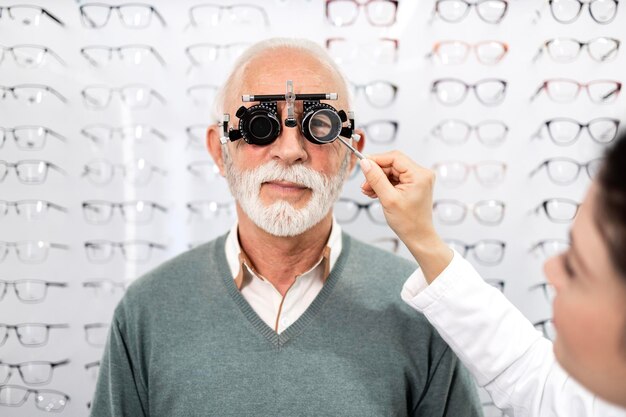Your Guide to Does Medicare Cover Optometry
What You Get:
Free Guide
Free, helpful information about Medicare Insurance and related Does Medicare Cover Optometry topics.
Helpful Information
Get clear and easy-to-understand details about Does Medicare Cover Optometry topics and resources.
Personalized Offers
Answer a few optional questions to receive offers or information related to Medicare Insurance. The survey is optional and not required to access your free guide.
Can Medicare Help Cover Your Optometry Needs?
Navigating healthcare coverage can often feel like deciphering an ancient text. But when it comes to understanding if Medicare covers optometry services, the answer isn't as mystifying as you might think. If you're wondering about how your eye care is impacted by Medicare's vast framework, you're not alone. Let's explore the particulars, and see what this means for you and your eyesight.
Understanding Medicare and Eye Care
Medicare, the federal health insurance program primarily for those aged 65 and older, covers a wide range of healthcare services. However, when it comes to routine eye exams for glasses or contact lenses, you may find yourself disappointed. Under Original Medicare (Part A and Part B), these regular services are generally not covered. Original Medicare solely covers ophthalmological services, which means eye care related to medical conditions such as glaucoma, macular degeneration, or cataracts.
What Medicare Pays For
Medicare Part B does provide coverage for:
- Medically necessary eye exams if you have diabetes or are at high risk for glaucoma.
- Yearly eye exams for diabetic retinopathy, if you have diabetes.
- Cataract surgery, including the cost of getting prosthetic intraocular lenses and one pair of corrective lenses (eyeglasses or contact lenses) post-surgery.
If you need coverage beyond this, such as glasses or routine eye check-ups, you might consider a Medicare Advantage Plan (Part C). These private plans, approved by Medicare, often include added benefits like vision care.
Exploring Financial Assistance Beyond Medicare
While Medicare might not cover routine optometry, there are ways to ease the financial burden. Optometry is essential for maintaining quality of life, especially as we age. So, where do you look if you're not ready to bear the costs alone?
1. Medicaid: Depending on your state and income, Medicaid might cover additional vision services. Its coverage can vary, so verify what’s available in your area.
2. State Vision Programs: Some states offer programs to help with vision care, especially for low-income seniors.
3. EyeCare America: This public service program provides exams and eye care for qualified seniors and those with certain risk factors.
4. Prescription Drug Discounts: Look into programs that offer reduced prices for prescription glasses and contacts.
5. Flexible Spending Accounts (FSAs) and Health Savings Accounts (HSAs): If you are enrolled in a health plan that offers these accounts, they can help pay for out-of-pocket vision costs with pre-tax dollars.
Financial Resources to Consider
To further support your healthcare financing—or any part of your budget—consider these options:
- Government Aid: Provides additional coverages typically not offered by insurance.
- Financial Assistance Programs: Tailored for seniors and those with disabilities who may need help with healthcare.
- Debt Relief Options: Consider consolidating healthcare debts to manage payments more effectively.
- Credit Card Solutions: Certain credit cards offer benefits for medical expenses.
- Educational Grants: While not directly related to optometry, these can help free up financial resources by covering other expenses.
💡 At a Glance - Financial Assistance Programs:
- ✅ Medicaid: State-dependent vision aid
- 👁️ EyeCare America: Free eye exams for those who qualify
- 💸 Flexible Spending Accounts: Use pre-tax money for vision expenses
- 📈 Debt Management Options: Consolidate to lower payments
- 💳 Credit Assistance Programs: For efficient medical expense handling
While Medicare's optometry coverage is limited, navigating your options can help ensure your eyes—and your wallet—receive the care they deserve. Be it through government programs, financial assistance, or innovative credit solutions, there's a path forward to clearer vision within your reach.
What You Get:
Free Medicare Insurance Guide
Free, helpful information about Does Medicare Cover Optometry and related resources.

Helpful Information
Get clear, easy-to-understand details about Does Medicare Cover Optometry topics.

Optional Personalized Offers
Answer a few optional questions to see offers or information related to Medicare Insurance. Participation is not required to get your free guide.


Discover More
- Am I Elgible For Medicare
- Am I Enrolled In Medicare
- Am I Qualified For Medicare
- Are Adult Diapers Covered By Medicare
- Are Chemotherapy Drugs Covered By Medicare Part d
- Are Colonoscopies Covered By Medicare
- Are Covid Tests Covered By Medicare
- Are Cpap Machines Covered By Medicare
- Are Cpap Supplies Covered By Medicare
- Are Dental Implants Covered By Medicare
